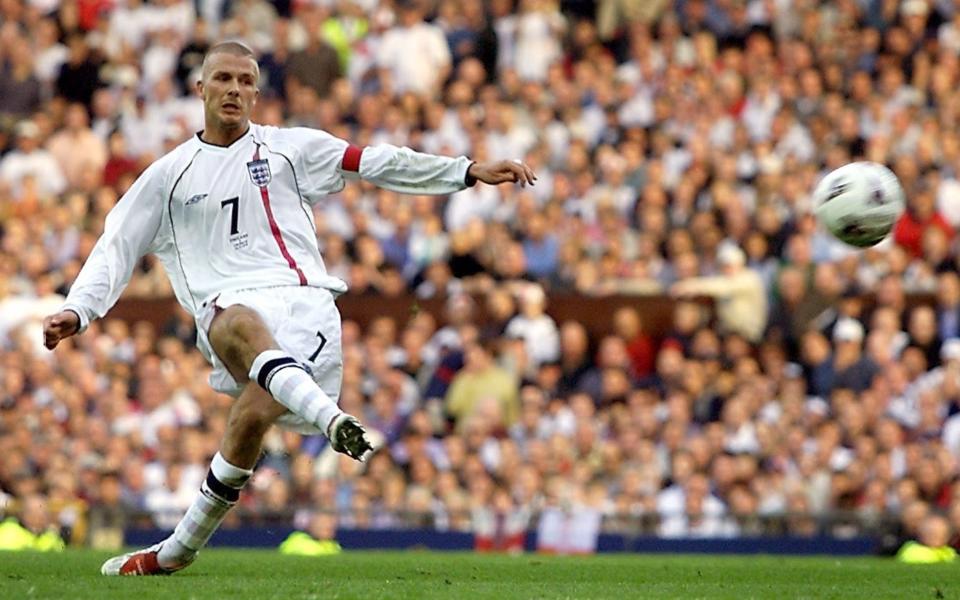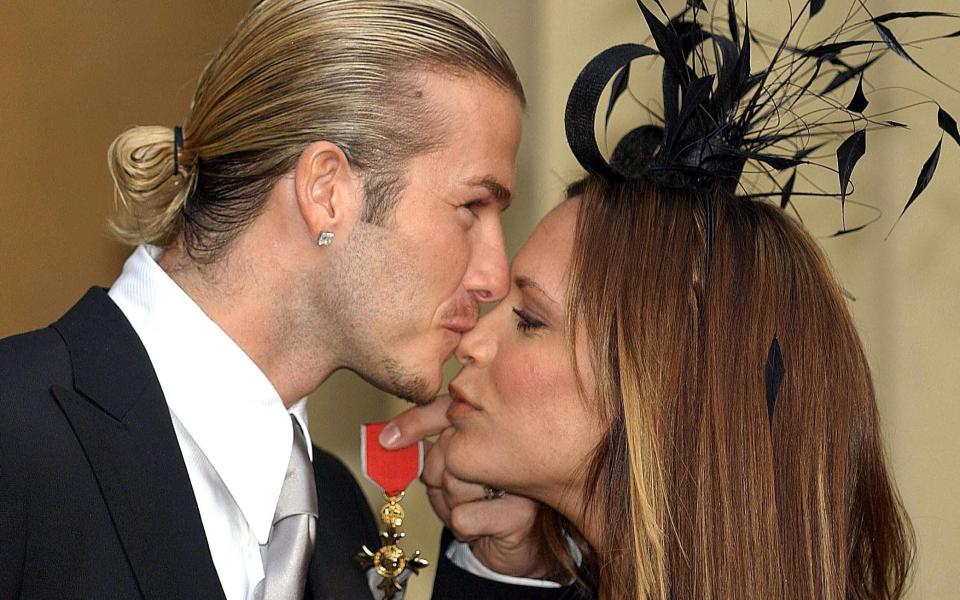How David Beckham became a one-man £750m empire

The goal that changed a World Cup qualifying campaign was scored 23 years ago this month by David Beckham, and while for many it would be the defining point of a career, for the man himself, it feels ever more a smaller part as the years roll by.
Beckham, now 49, may be the most famous Englishman on the planet – even though he stopped playing professional football 11 years ago. He is also one of the few former players who seems just as marketable post-football and accordingly is getting richer and richer. Impervious to scandal, a giant on social media, and a money machine. Even if he has still not been granted the knighthood.
His 93rd-minute equaliser in 2001 against Greece, who play England at the new Wembley for the first time tonight, remains a classic of the genre. A perfectly-executed free-kick that secured the draw that would take England to the 2002 World Cup finals and ensured the nation came to regard the man who struck it very differently. It has become part of the Beckham mythology, which is a heady mix. Part nostalgia, part aspiration, part Beckham family reality show. All that, plus the mellowing into middle-age of a 2000s icon has proved a very lucrative business.
At the time, the Greece goal sealed the rehabilitation of Beckham with the England football public post-1998 red card. By 2001 he was already the Champions League-winning Manchester United homegrown midfielder, with five Premier League titles. He was a very marketable England captain with a famous wife. The moves to Real Madrid and then to the United States would come – so too the drama, the scandal, the tears, and three more Beckham children.

Beckham the entrepreneur has parlayed his playing career into an extremely successful business. He has honed his commercial operation over almost three decades of fame. He has adapted to the digital age having lived through the battles with the old media. His self-produced documentary on Netflix showed how deftly he can control the perception of him for a new generation. He has a portfolio of endorsements to match even the most famous footballers still playing the game.
Through it all, with just one small concession during his Netflix extravaganza he has adopted the Royal family’s approach to scandal, criticism and rumour. Never explain, never complain. It has served him very well. Celebrity has become his core business. The Beckham brand is rented out to luxury brands, hotel chains and crisp manufacturers. Meanwhile, the Beckham legend is burnished without him ever having to manage a team or sit in a pundit’s chair.

What is Beckham worth?
He will not be at Wembley on Thursday night. His focus this month is in the United States to watch his Major League Soccer franchise Inter Miami compete in the play-offs. The team that encompasses the world’s greatest player, Lionel Messi, as well as the ageing legends like Luis Suárez and Sergio Busquets, reflects glory back on the man who personally owns a quarter of Inter. They are already league champions, with the best regular season record.
It is Beckham’s ownership of Inter – having cashed in the right to acquire a franchise at a cut-price rate as part of his 2007 deal to join MLS – that accounts for a large slice of his huge personal fortune.
What is Beckham worth? Estimates range from £450 million to as much as £750 million. In 2022, he sold 55 per cent of his key commercial vehicle DB Ventures to the US brand management company Authentic for £207 million. Authentic is itself owned by US private equity, including CVC Capital Partners, who, with around $180 billion (£138 billion) under management, own stakes in Spain’s La Liga and France’s Ligue 1.
In return, Beckham became a major shareholder in Authentic. His Inter Miami stake is held separately from that association. In total the franchise could be worth as much as £1.2 billion, especially given planning has been granted for a new 25,000-capacity stadium in Freedom Park, just east of the city’s airport.
For a taste of what Beckham the brand generates, the surest indicator is the last published accounts for DB Ventures, covering his 2022 earnings. The company, which sold the stake to Authentic that year, booked profits of £31.7 million on a turnover of £57.4 million. A formidable one-man industry, served by 24 staff, from which Beckham himself was paid £20 million in dividends.
Qatar was riskiest deal
That was the principal 12 months for his multi-year deal with Qatar to endorse the tiny Gulf state and its Fifa World Cup. The suggested value of £150 million was never confirmed, never denied. That was Beckham’s riskiest deal given the outcry – principally from the gay community, dismayed that a man they considered an ally should work for a state where homosexuality was criminalised. Beckham did what he always did. Shrugged his way through it, refused to give any interviews in which the issue might be interrogated – and just carried on.

Two years on, his brands make for a remarkable list. His association with Adidas, for whom he does an annual campaign for the Predator boot, has run in some form for more than 30 years. It even predates his relationship with wife Victoria. The gaming generation know him from EA Sports’ Fifa and EAFC games. There is a Beckham sunglasses range with the licensee Safilo. He has endorsements with Rolex’s Tudor Watches, Nespresso, Bowers & Wilkins audio, Boss suits, SharkNinja kitchen equipment, Stella Artois and Sands hotels group’s Asian market.
He has had shorter-term deals with Netflix and the Disney+ platform. With the US broadcaster CBS Paramount+ he has agreed a US-only deal to do a Champions League “watch-along” show in which he watches the semi-finals and final with famous friends. A format best described as punditry-lite. Formerly a long-term Pepsi endorsee, he has done a one-off deal with parent company PepsiCo subsidiary Frito-Lay for a campaign to advertise crisps, marketed in the UK under the Walkers brand.
If you hire the Beckham brand, you get the whole package. His Studio 99 production company will make the commercial itself – created so that Beckham could have a measure of control over the whole process. He grew tired of dealing with third-party advertising agencies who proposed campaigns he did not necessarily like. Studio 99, part of the Authentic deal, has made 300 commercials, including many that did not feature Beckham. Studio 99 has also made documentaries about Ronnie O’Sullivan, the history of the Premier League and the corporate rivalry between Puma and Adidas.
It also made the Netflix Beckham show, a big hit for the streaming platform. It was in that documentary that for the first time, Beckham hinted at a marital infidelity, although in a kind of code that proved confusing for those who did not know the background. The woman in question, Rebecca Loos, who had worked as his PA in Madrid, responded with an excoriating four-page interview in the Mail on Sunday. For a moment, it seemed like Beckham might have opened a can of worms.
And then, as it always seems to do with Beckham, it all went away. Swept aside by the great nostalgia that the documentary evoked for the era in which Beckham played, a conversation with Victoria about her privileged childhood, as well as some general bumbling around in the outdoor kitchen of his Cotswolds mansion. There is no doubt that this is a man whose shrewdness when it comes to giving the people what they want knows no limits.

The Beckham side would point out that Netflix had the final cut and Beckham himself gave up 50 hours for interviews with the director Fisher Stevens. By the end it felt like all concerned had been charmed into submission by the central character who also happened to own the production studio. Any criticism of that is waved away as parochial. The global audience, it is pointed out, loved it.
The Netflix show reinforced the Beckham brand. It also blitzed into submission an unauthorised biography of David and Victoria by Tom Bower. Lacking major revelation, it was poorly reviewed and sunk largely without trace. Which is presumably just the way Beckham would have wanted it.
He does not do it all alone. His childhood friend Dave Gardner, whom Beckham met when he moved to Manchester in the early 1990s to start his apprenticeship at United, is a key aide and a director of DB Ventures. Another director, experienced executive Nicola Howson is de facto CEO of Beckham Inc. and deals with everything from commercial partnerships to the more tenacious elements of the British press.
If Beckham was just any famous former player, he would probably be on the pitch at Wembley to take his applause from a crowd who still get a warm feeling when they remember that Old Trafford goal in 2001. But Beckham, a man who understands the psyche of the English public – what they like and what they don’t – is no ordinary ex pro. He will be on and off private jets this week, working with brands and playing the role that has made his famous and immensely rich – the professional persona of David Beckham.

